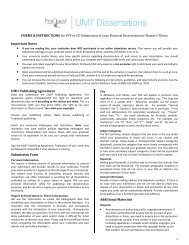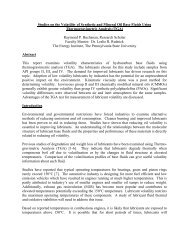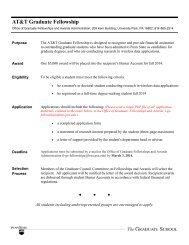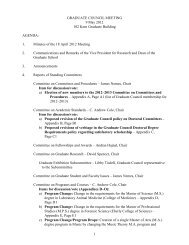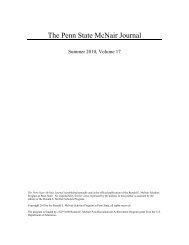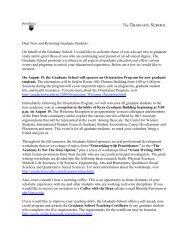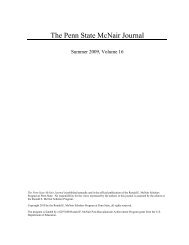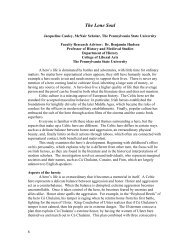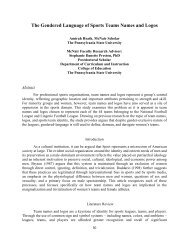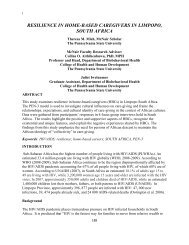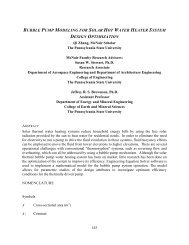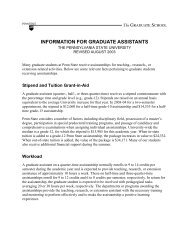1 GRADUATE COUNCIL MEETING 18 January 2012 102 Kern ...
1 GRADUATE COUNCIL MEETING 18 January 2012 102 Kern ...
1 GRADUATE COUNCIL MEETING 18 January 2012 102 Kern ...
Create successful ePaper yourself
Turn your PDF publications into a flip-book with our unique Google optimized e-Paper software.
Minutes of the Meeting December 14, 2011<br />
The Graduate Council -5-<br />
Ms. Thurley reported that in 1995, the U.S. Public Health Service (PHS), part of the Department of<br />
Health and Human Services, passed a regulation requiring institutions who receive federal funding to enact a<br />
policy regarding conflict of interest. Since 1995, Penn State has had a robust conflicts of interest policy and has<br />
required examination of financial disclosures with regard to consultation and compensation, company<br />
ownership, IP, which includes patents, royalties, etc., and positions held (e.g., CEOs, members of boards, etc.).<br />
She noted that Penn State’s current policy (RA-20) deals with “transactional disclosures,” requiring that any<br />
significant financial or business interests by investigators be reported (funded or unfunded research) at the time<br />
of the transaction or activity; investigators must answer questions on the conflict of interest on-line disclosure<br />
form (COINS). She noted that the College of Medicine uses a different model, in which all investigators<br />
disclose all significant financial or business interests annually.<br />
She indicated that the National Institutes of Health (NIH) initiated changes about three years ago that<br />
impact Penn State’s policies. There was considerable media attention when Senator Grassley of Iowa identified<br />
discrepancies in reporting at several institutions. NIH was informed that revisions were needed and that<br />
institutions needed to be transparent about all conflicts or potential conflicts. In August 2011 revisions were<br />
published with an implementation deadline of August <strong>2012</strong>; some of the changes will be implemented at Penn<br />
State beginning in March <strong>2012</strong>, with full compliance planned by the August deadline.<br />
Ms. Thurley presented the revisions, which include a new definition of investigator: anyone who is<br />
responsible for the design, conduct, or publication of research. This includes faculty, students, and staff involved<br />
in research activities. The previous threshold for reporting purposes was $10,000; the new threshold will be<br />
$5,000, and this includes both public and non-public companies. This changes the previously allowed exclusions<br />
for compensation for working with non-profits. Travel sponsored or reimbursed by outside entities must now be<br />
disclosed, with no minimum threshold for reporting (this does not include travel paid for under a sponsored<br />
award). She added that exclusions will remain for some funding sources (e.g., federal, state, and local<br />
government agencies). Funding provided by other institutions of higher education, private foundations, and<br />
medical schools also is excluded.<br />
She noted that the new policy will mimic the College of Medicine’s current model. All investigators<br />
will be required to complete annual disclosures (beginning in <strong>2012</strong>). Implementation at Penn State will be<br />
staggered for all investigators; and so in year one, all investigators who meet the new definition and have<br />
PHS/NSF funding or pending funding will be the first to be required to annually disclose. Over years two and<br />
three the requirement will be implemented to include all colleges, units, and campuses and all investigators.<br />
Ms. Thurley reported that the sponsored awards database will be used to identify those investigators who must<br />
report. She indicated also that Penn State will be federally required to train investigators every four years<br />
regarding this requirement, and Penn State will be required to provide public accessibility to any conflicts of<br />
interests related to PHS funded research that the University identifies. If a conflict is identified in PHSsponsored<br />
research, Penn State must provide a written response to the requestor within five business days; or<br />
Penn State must publicly post all identified COI related to PHS research on its website. She added that the new<br />
PHS regulation outlines a non-compliance process that will only apply to PHS sponsored research (e.g., NIH<br />
research); and that process involves retrospective review of the research for bias and reporting of any bias found<br />
and the University’s plan to mitigate the bias to the PHS sponsoring agency. The COI Office will continue to<br />
investigate and respond to all reports of non-compliance (e.g., implement corrective actions and<br />
education/training) under the revised University policy; however, the retrospective review for bias will be<br />
reserved for PHS-sponsored research only.<br />
Ms. Thurley then outlined the implementation process. She reported that her office has participated in a<br />
number of national webinars and has sought input on the policy from the Provost and the Vice President for<br />
Research, the College of Medicine COI Administrators, the Senate Committee on Research, the COI<br />
Committee, CIC Colleagues (benchmarking), and other Penn State offices. She indicated that the Provost is



